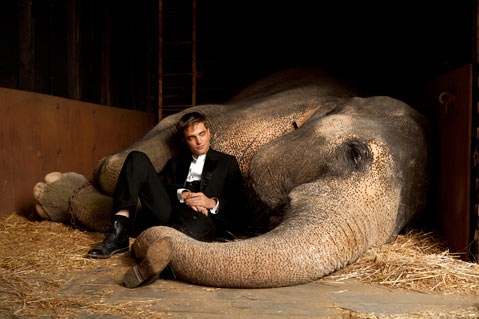Water for Elephants
Robert Pattinson, Reese Witherspoon, and Christoph Waltz star in a film written by Richard LaGravanese, based on the novel by Sara Gruen, and directed by Francis Lawrence.

Fellini loved the circus, and he could easily locate the bond of commonality between that world and the medium of film: a traveling show hell-bent on supplying laughter, entertainment, and tears of a clown. A bit of Felliniesque love and lore might have helped the periodically involving, but generally sinking ship that is Water for Elephants, a timid screen adaptation of Sara Gruen’s novel about a love triangle in a Depression-era circus.
At its best, the film is a colorful period piece that follows our handsome young protagonist (Robert Pattinson) into the accidental act of “joining the circus,” with grit and wits attached. Heart and loins follow, as he falls for the Benzini Brothers’ star attraction, a horse- and, later, elephant-riding princess (Reese Witherspoon), whose fierce husband (Christoph Waltz) is a smooth-tongued devil, not above animal abuse or tossing unwanted workers off a moving train.
You know when actors are failing to deliver or dig into the essence of a character when the viewer channels back to the actors’ more famous roles. During the bland, chemistry-less scenes between Pattinson and Witherspoon, our minds drift and we see the ghosts of vampires and legalese blondes. Waltz, as the sadistic ringleader of this dog, pony, clown, and elephant show, is another story. The Austrian actor, who rightfully nabbed an Oscar for his work in Inglourious Basterds, steals the show again here, with a sleekly sinister role that makes his costars look meek by comparison.
Overall, there’s something wrong with the tone of this film, which could be a tart and tasty noirish saga instead of the smug, black-and-white melodrama it turns into. Composer James Newton Howard’s mawkishly generic Hollywood fairy-dust score doesn’t help, although cinematographer Rodrigo Prieto’s work—with its careful scene-painting mastery—is often stunning.
In the end, the film’s major flaw—apart from the love interests, who fail to convince us their minds are on the job at hand—is that the warm fuzzies get in the way of the cool nasties. We’re left yawning, slouching toward the exit of this multiplex little top.



